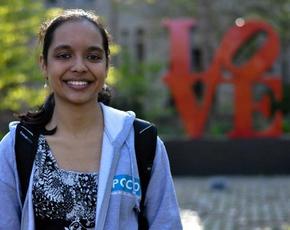
“I first got involved in research in political science as a freshman,” Mittal says. “I began working as a research assistant in the department and learned a lot about empirical social science. I realized then that my path was in exploring questions about patterns of society, particularly datasets that can be used to explain the behaviors of individuals.”
During her freshman year, Mittal investigated the voting public’s stance on the birtherism movement. She discovered that the different phrasing various major news outlets used in surveys of public opinion before and after President Obama’s long-form birth certificate was released caused their polls to produce notably different results. Working on the project with two professors, she eventually coauthored a paper on the findings in Public Opinion Quarterly.
By the end of her junior year, Mittal decided to use her research background to pursue an honors thesis. “The goal was to have a capstone experience where I could apply the skills I learned from projects like the birtherism study and sort of test myself to see if I could not only pull off the analytic side, but also the investigating and data gathering.”
Among the many topics she discussed with her thesis advisor, Assistant Professor of Political Science Marc Meredith, one in particular caught her attention: campaign finance before and after the Citizens United Supreme Court ruling in 2010. The decision held that it was unconstitutional for the government to limit independent expenditures by corporations, labor unions, and other associations. A follow-up ruling by a lower court in turn ruled that individuals could also contribute unlimited amounts in the form of independent expenditures to independent-expenditure-only Political Action Committees (PACs), which led to the formation of SuperPACs. Mittal was particularly intrigued by the SuperPACs’ giving behavior in different state-level electoral races and how these rulings would affect individuals’ giving habits through direct and indirect channels, given that they could now have a much greater impact indirectly on political campaigns through donations to these associations.
“SuperPACs have the ability to effect major changes in political campaigns, and while it is illegal for campaigns to be involved with the SuperPACs, often ex-campaign workers end up in the mix. It’s one of the many possible loopholes that I would like to find out more about,” says Mittal.
Mittal is also examining state-level contributions, where contribution caps are usually maintained independently of the federal government. Out-of-state expenditures, she says, are of particular interest, because they show the lengths individuals might go to sway results on a national level—if a donor from Pennsylvania supports a congressional candidate in Maryland, for instance, a win could tip the balance in Congress.
“The biggest challenge is the gray area in disclosure requirements,” Mittal says. “There’s no clear federal law that says if you give to a SuperPAC, particularly for state-level races, you have to report it in a consistent manner to the Federal Election Commission. But I’m hoping to tease out findings by sorting through direct contributions records. Searching for testable data is part of what makes the process rewarding.”


